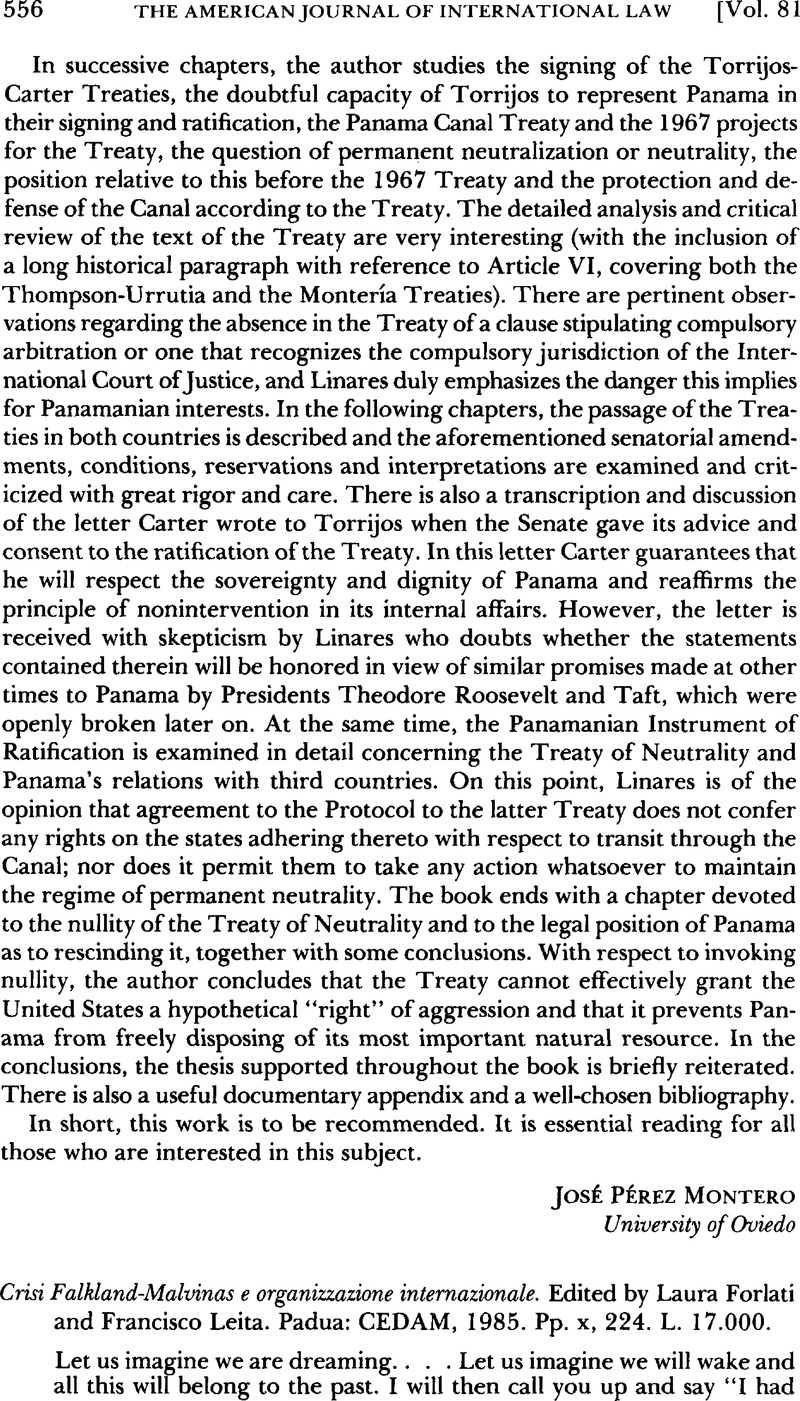No CrossRef data available.
Article contents
Crisi Falkland-Malvinas e organizzazione internazionale. Edited by Laura Forlati and Francisco Leita. Padua: CEDAM, 1985. Pp. x, 224. L. 17.000.
Published online by Cambridge University Press: 27 February 2017
Abstract

- Type
- Book Reviews and Notes
- Information
- Copyright
- Copyright © American Society of International Law 1987
References
1 Jorge Luis Borges, in a conversation reported in Black Water. The Book of Fantastic Literature 345 (Manguel, A. ed. 1983)Google Scholar.
2 Walzer, M., Just and Unjust Wars 3–20 (1977)Google Scholar.
3 See Declaration of the Argentine Foreign Minister in the Security Council, UN Doc. S/PV.2350 (1982), reprinted in Perl, R., The Falkland Islands Dispute in International Law and Politics 432, 437 (1983)Google Scholar.
4 A personal experience will suffice to illustrate this. When the present writer was a member of the Argentine delegation that met with the British in Lima, Peru, in February 1978, to discuss the Malvinas controversy, the British delegates first listened politely to our proposals (which included a broad scheme of economic cooperation designed to bribe them into recognizing Argentine sovereignty). As soon as we had finished, they retrieved brochures displaying the most recent models manufactured by their ship industry and started explaining the reasons why the Argentine Government should buy them.
5 See Battaglini at 2, 6–10.
6 See the revealing study by Doyle, , Kant, Liberal Legacies and Foreign Affairs 12 Phil. & Public Aff. (pt. I) 205, and (pt. II) 323 (1982)Google Scholar, which argues that wars have never taken place among liberal states.
7 Aside from the legal or moral correctness of their action, the prudential miscalculations of the junta’s members were truly incredible. Not only did they reject proposals that were much more advantageous to them than anything they could have got by negotiation (see Coll, , Lessons for the Future in The Falklands War 232–38 (Coll, A. & Arend, A. C. eds. 1985)Google Scholar), but, in their madness, they also believed that (1) the United States would be neutral; (2) the Soviet Union would veto anti–Argentine resolutions in the Security Council; and (3) the British would not react.
8 The post–1982 literature on the Malvinas is voluminous. See the books by R. Perl, supra note 3, and Coll and Arend (eds.), supra note 7; and La Questione delle Falkland–Malvinas nel diritto internazionale (N. Ronzitti ed. 1984). There is also a periodical literature that is extensive in this Journal alone. See Acevedo, , The U.S. Measures Against Argentina Resulting from the Malvinas Conflict 78 AJIL 323 (1984)CrossRefGoogle Scholar; Franck, , Duke et Decorum Est: The Strategic Role of Legal Principles in the Falklands War 77 id. at 109 (1983)Google Scholar; and Moore, , The Inter–American System Snarls in Falklands War 76 id. at 830 (1982)Google Scholar. For a serene Argentine account, see Vinuesa, R., El Conflicto por las Islas Malvinas y el derecho internacional (1982)Google Scholar.
9 For an American perspective, see Moore, supra note 8; see also Perera, The OAS and the Inter–American System: History, Law, and Diplomacy, in Coll & Arend (eds.), supra note 7, at 132.
10 Unfortunately, the recent British declaration of a 200–mile fishing zone around the islands is most unhelpful in this regard.




